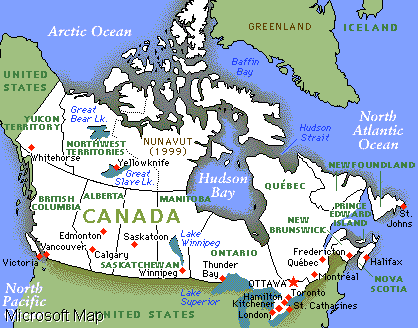Home
úÁÒÁÂÏÔÁÊ!
÷ÁÛ ÚÁËÁÚ
îÏ×ÏÓÔÉ ÓÁÊÔÁ
ôÏÐÉËÉ
äÉÁÌÏÇÉ
ðÏÜÚÉÑ
òÅÆÅÒÁÔÙ
CÅÒÔÉÆÉËÁÔÙ
ðÅÒÅÐÉÓËÁ
÷ÁÛ ÛÁÎÓ
óÔÒÁÎÏ×ÅÄÅÎÉÅ
ïÂÕÞÅÎÉÅ
óÌÏ×ÁÒÉ
÷ÁÛÅ ÍÎÅÎÉÅ
áÎÅËÄÏÔÙ
CÓÙÌËÉ
Contact Us
![]()

Canada
, federated country of North America, bounded on the north by the Arctic Ocean; on the northeast by Baffin Bay and Davis Strait, which separate it from Greenland; on the east by the Atlantic Ocean; on the south by the United States; and on the west by the Pacific Ocean and Alaska. It was formerly known as the Dominion of Canada. Occupying all of North America north of the conterminous United States, except Alaska, Greenland, Saint-Pierre Island, and the Miquelon Islands, Canada is the world's second largest country, surpassed in size only by Russia. It includes many islands, notably the Canadian Arctic Islands (Arctic Archipelago) in the Arctic Ocean. Among the larger members of this group, which in aggregate area is about 1,424,500 sq km (about 550,000 sq mi), are Baffin, Victoria, Ellesmere, Banks, Devon, Axel Heiberg, and Melville islands. Cape Columbia, a promontory of Ellesmere Island at latitude 83œ06' north, is the northernmost point of Canada; the country's southernmost point is Middle Island in Lake Erie, at latitude 41œ41' north. The easternmost and westernmost limits are delineated, respectively, by longitude 52œ37' west, which lies along Cape Spear, Newfoundland, and longitude 141œ west, which coincides with part of the Alaskan-Yukon frontier. Canada has a total area of 9,970,610 sq km (3,849,652 sq mi), of which 755,180 sq km (291,575 sq mi) is covered by bodies of fresh water such as rivers and lakes, including those portions of the Great Lakes under Canadian jurisdiction.Canada contains great reserves of natural resources, notably timber, petroleum, natural gas, metallic minerals, and fish. It is also an important manufacturing country, and its major cities, such as
Toronto, MontrÊal, Vancouver, Ottawa (the country's capital), Edmonton, Calgary, and Winnipeg are bustling centers of commerce and industry. Most of Canada's inhabitants live in the southern part of the country, and vast areas of the north are sparsely inhabited. The country is divided into ten provinces (Alberta, British Columbia, Manitoba, New Brunswick, Newfoundland, Nova Scotia, Ontario, Prince Edward Island, Quebec, Saskatchewan) and two territories (Northwest Territories, Yukon Territory). A third territory called Nunavut, to be carved from the present Northwest Territories, will be created in 1999. The name Canada is derived from an Iroquoian term meaning “village” or “community.”